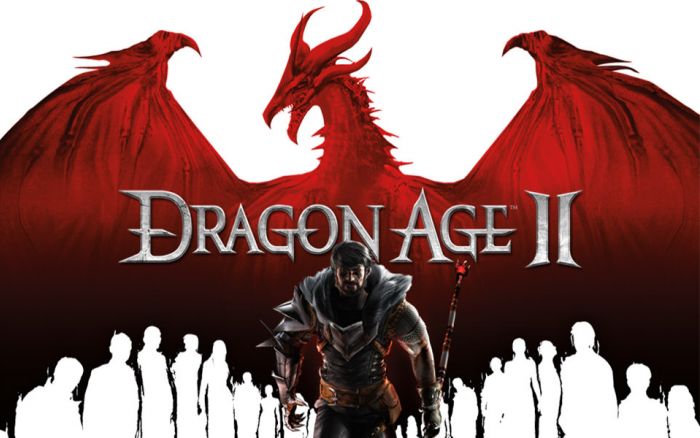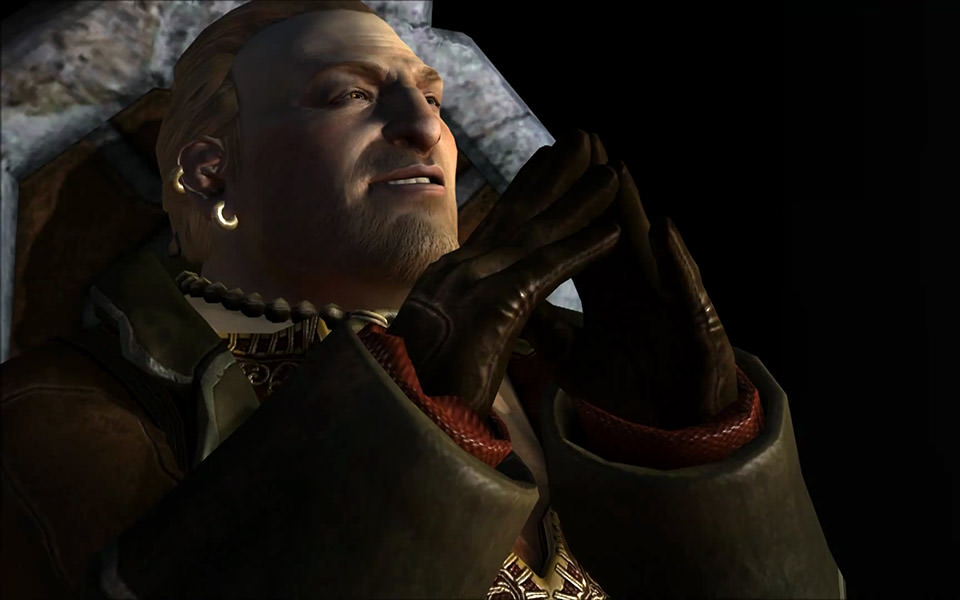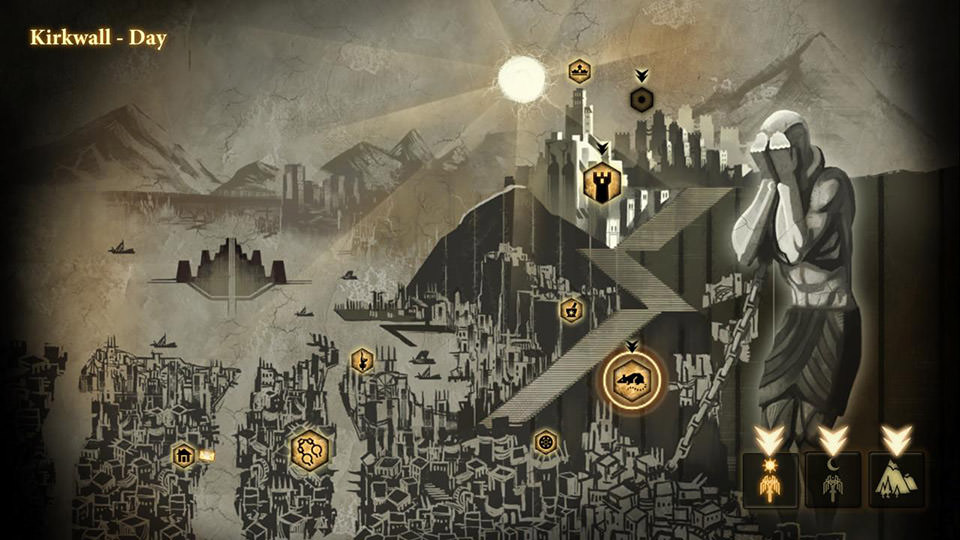How Dragon Age 2 Undermines Its Own Narrative

Political intrigue and corruption, theological and ethical quandaries, family drama, romance, tragedy, international conflict, blood-soaked battles: Dragon Age 2 has all of these and more. BioWare’s sequel to 2009’s Dragon Age: Origins may not span the continent of Thedas like its predecessor, but it’s no less ambitious, packing all of the aforementioned elements into a storyline that spans a decade in the life of one of the most important figures in the Dragon Age world.
And yet, as I explored the ancient, gloomy city of Kirkwall as Hawke, a lowly refugee who begins making a name for himself amidst social and political upheaval, and ultimately emerges as the city’s “Champion,” I found myself curiously unmoved. Indeed, as the game wore on, I became increasingly frustrated. This is no small matter, seeing as how this is BioWare we’re talking about, makers of some of the finest RPG video games in recent history.
What makes BioWare games so good is that they’re adept at getting the player to become emotionally invested in their storylines via romance, tragedy, ethical dilemmas, epic scopes, and just good storytelling. There have been times while playing BioWare games, such as Mass Effect 2, where I had to put down the controller and walk away for awhile in order to give myself time to think through whatever dilemma had just been thrown in my path. Which is disconcerting — wasn’t this just supposed to be a game? — but also a refreshing and challenging break from the glut of mindless first-person shooters.
This rarely held true with Dragon Age 2, however. The only thing that was disconcerting about the game was how little I was actually disconcerted by the game, despite its pervasive sense of gloom, doom, and tragedy. The brutal deaths of family members, the betrayals and backstabbings, the moral dilemmas: none of them seemed to matter. I believe there are two key reasons for this.

1. Don’t Believe The Dwarf
The vast majority of Dragon Age 2 occurs in the form of flashbacks. Your story is told by one of your companions, a dwarven rogue named Varric Tethras who is being questioned by the Chantry, the game’s primary religion (think the Catholic Church), regarding Hawke’s life. Essentially, the world is going to hell in a handbasket and the Chantry believes that Hawke is somehow at the center of it all, and they want to know why.
The flashback structure is an interesting storytelling method, but it has one significant problem. Early on, it’s established that Varric is an unreliable narrator. The initial version of events that he gives to the Chantry regarding Hawke’s exploits is wildly embellished, from Hawke’s fighting prowess to the size of his sister’s breasts. Furthermore, as you proceed in the game, Varric proves to be the consummate storyteller, basically establishing himself as Hawke’s PR department and encouraging increasingly outlandish stories about Hawke’s rise to power and fame.
Unreliable narrators are tricky to begin with, regardless of the medium. Sometimes they can be used to add an extra layer of characterization, especially if used in the first-person sense. Or, in the case of a movie like Rashomon, they can make interesting philosophical points regarding mankind’s fallibility, the elusive nature of truth, etc. But in the case of Dragon Age 2, Varric’s status as an unreliable narrator undermines Hawke’s heroism. If Varric’s retelling is established to be less than trustworthy, then what does that mean for the character of Hawke, his companions, and their actions, victories, defeats, betrayals, and sacrifices? How can I, as the player, trust that the characters actually do anything that I saw (and made) them do within the story? Were all of my — and their — efforts potentially in vain?
I realize that this all sounds rather “meta”, and may seem trivial, particularly within the context of a video game. But certainly the goal of a game like Dragon Age 2 is to immerse me in a fully realized mythical world — just read the in-game codex to get a sense of how deeply thought out the world of Thedas is (Tolkien would be proud) — where I’m allowed play a part in the fashioning of an epic hero. Indeed, where I can enter into the story and become invested in it in a manner and to an extent that “simply” reading a good fantasy novel can’t allow for.
It’s a delicate balance, and I have nothing but respect for the amount of work that goes into plotting a game that seeks to balance a player’s free will with the needs of a convincing, detailed, and emotionally affecting tale. That being said, I find it odd that BioWare would introduce an unreliable narrator, an element whose very purpose is to “break the spell” — to pull back the curtain and reveal the story to be something other, and perhaps even less, than what it was previously thought to be.
This tactic could have been interesting had the unreliable narration been rolled into the plot to a greater degree: perhaps as a tactic employed by Varric to deceive the Chantry, protect Hawke, or some other purpose. And it could very well be that Dragon Age 3 will clear this all up (and if it does, I will gladly stand corrected). But, as best as I can tell right now, the game only plays with this “deeper” approach once or twice, and so we’re left with a tiny, niggling doubt as to the exact merits and details of Hawke’s actions and choices. The only way it could’ve been more frustrating is if the whole game had turned out to be a dream.

2. We Have All The Time In The World
Once you arrive at Kirkwall, and begin your decade-long ascent to power, you begin receiving all manner of quests. Some of these quests take place in Kirkwall during the day, some at night, and some in the regions immediately surrounding the city. The game’s map screen gives you a way to toggle between these three “zones”, so that, for example, you can set up a meeting at midnight during the day and then jump ahead to Kirkwall at night to actually attend the meeting. Or you can receive a letter at your stately manor regarding some hidden cave filled with beasties and treasure in the surrounding wilderness, and quickly jump out to the wilderness to do some dungeon crawling.
This makes certain game mechanics easier, but it also completely destroys any sense of time within the game, and subsequently removes any sense of urgency from the game’s events. For example, after I had entered the game’s final act, in which the the central conflict between the Chantry and the mages under its control comes to a head, I realized that I had completely botched my characters’ leveling, thus preventing me from using some of the kick-ass weapons, armor, etc. that I had accumulated. And so, with the specter of internecine warfare and social strife looming over my head, I began grinding, i.e., going on any and all side and secondary quests to build up my characters.
Normally, this would mean little more than lots of button-mashing. But in the case of Dragon Age 2, it also meant a fair amount of toggling between Kirkwall in the daytime and Kirkwall at night. Assuming that Thedas’ time works similarly to Earth’s time, and that we’re talking about sequential days and nights, I think I spent around two weeks of in-game time leveling up my characters. Two weeks during which the Chantry was oppressing mages, and during which mages were sowing seeds of sedition and even potential terrorism. But I was never once penalized for my lack of urgency in dealing with the game’s climactic crisis, nor was I reminded that there were more important things than killing random monsters that I ought to be doing.
In all fairness, I also had this issue with Mass Effect 2, but there was a whole galaxy to traverse, one mass relay at a time — so I, as far as the game’s world was concerned, had some time. But in Dragon Age 2, I was told time and again that things were bad and only going to get much, much worse. But apparently, both sides were perfectly willing to bide their time whilst I gallivanted about the city and nearby countryside so that I could bulk up enough to wear some new, shiny piece of armor.
This brings us back to the issue of balancing player freedom with the needs of the storyline. In this case, BioWare erred on the side of my freedom as a player, and subsequently, undermined the storyline and robbed it of drama and urgency. I can’t help but wonder what it would have meant for the game had I been told that I only had a certain number of days in which to settle my affairs, i.e., build up my characters, before all hell broke loose. Or, if the game called me out for my laziness and prevented me, in some way, from traveling to certain locations or visting with certain individuals because Kirkwall was about to explode in bloodshed.
As a player, I might’ve been frustrated at the loss of freedom. (I certainly would’ve been kicking myself for my lack of foresight and planning.) But would such an approach have driven home even more pointedly the notion that something was truly at stake, that the lives of countless individuals were riding on my shoulders? If a good story is contingent upon crisis, what better crisis could there be than knowing that, however unprepared I thought my companions and I might be, we had to head into the storm nevertheless — that the city of Kirkwall, the Chantry, the Mage’s Circles, and the whole of Thedas were depending on it?
Conclusion
The best review of Dragon Age 2 that I’ve read so far comes from Paste Magazine’s Kirk Hamilton, in which he writes that the game’s “main storyline is a sloppily scripted tease for a grander tale that has yet to be told, and its side stories feel empty and pointless.” “Empty” and “pointless” are two words that I, reluctantly and begrudgingly, have to agree with. What makes it most frustrating of all is that there are adjustments and tweaks that BioWare could’ve made to the game, to the narration and some of the game mechanics, that would’ve made the game far stronger and more compelling. As it stands, though, Dragon Age 2 is a game full of promise, but also a game that consistently prevents itself from realizing the vast majority of that promise.